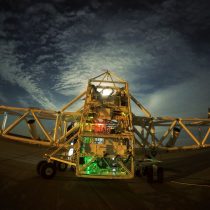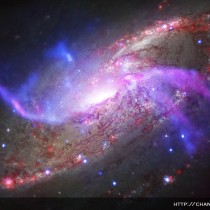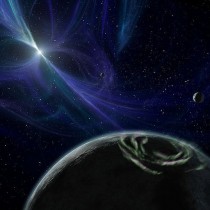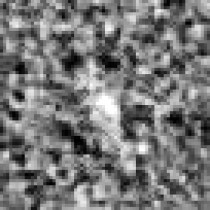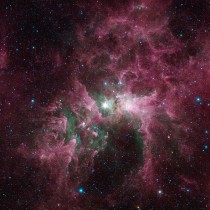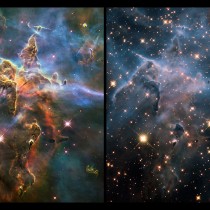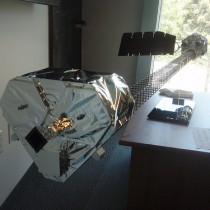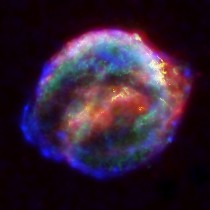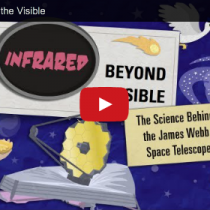Peering into the Dusty Corners of the Universe with BETTII
- By Sara Mitchell
- June 8, 2017
- Comments Off on Peering into the Dusty Corners of the Universe with BETTII
Sara’s note: We’re excited to tell you about one of the Goddard-built balloon-borne astrophysics missions launching this week! This is a guest post (and photos) from Dr. Stephen Rinehart. The Balloon Experimental Twin Telescope for Infrared Interferometry (BETTII) is a 8-meter long far-infrared interferometer designed to fly on a high … Continue Reading →
The Most Important Wavelength
- By Maggie Masetti
- June 22, 2015
- Comments Off on The Most Important Wavelength
I was recently asked whether optical telescopes were the most important kind – or if they weren’t – what the most important wavelength of light was. The answer truly is – they are all important! Most astronomical objects and phenomena emit light at more than one wavelength – so if … Continue Reading →
A Ride on SOFIA
- By Maggie Masetti
- September 5, 2014
- Comments Off on A Ride on SOFIA
This is a guest blog by astronomer Brian Williams, who last blogged for us about the building blocks of life. A joint project between NASA and the German space agency (DLR), the Stratospheric Observatory for Infrared Astronomy, or SOFIA, is a bit of a departure from NASA’s traditional telescope fleet. … Continue Reading →
Why infrared? (exoplanet edition)
- By Maggie Masetti
- October 24, 2013
- Comments Off on Why infrared? (exoplanet edition)
I’m not sure I’ve yet to meet a person who didn’t find the idea of planets around other stars fascinating. I’m no different. I grew up in an era where the only planets we knew about were the ones in our own solar system. When I went to college to … Continue Reading →
Why infrared? (earliest galaxies edition)
- By Maggie Masetti
- September 12, 2013
- Comments Off on Why infrared? (earliest galaxies edition)
This is the second blog in a series which asks the question, why infrared? Last time we looked at how infrared light could reveal baby stars hidden from visible-light observatories by opaque clouds of gas. In this blog I’m going to talk about (what else?) the James Webb Space Telescope … Continue Reading →
Happy birthday, Spitzer!
- By Maggie Masetti
- September 6, 2013
- Comments Off on Happy birthday, Spitzer!
Seems like only yesterday we were celebrating the 5th birthday of the Fermi Gamma-ray Space Telescope. As it turns out, there’s another space telescope celebrating a big anniversary – the Spitzer Space Telescope just turned ten on August 25th! I know talk a lot about JWST and how amazing it’s … Continue Reading →
Why infrared? (nebula edition)
- By Maggie Masetti
- August 16, 2013
- 2 Comments
As someone who fields a lot of questions about the James Webb Space Telescope, a giant infrared observatory being built right now, I see a lot of “Why infrared?” questions. There are a lot of answers to this, but here’s one I think is particularly interesting and illustrative of why … Continue Reading →
Try on a pair of NuSTARs!
- By Daniel Wik
- February 26, 2013
- Comments Off on Try on a pair of NuSTARs!
Sara’s note: Please join us in welcoming our newest guest blogger, Dr. Dan Wik! You might have heard our interview with Dan in our podcast NASA’s Newest X-Ray Eyes, and we’re excited to get more behind-the-scenes coverage of NuSTAR and Dan’s research in his blog posts. Imagine you are usually … Continue Reading →
A Look into the Building Blocks of Life
- By Brian Williams
- February 22, 2013
- 1 Comment
Maggie’s note: Please welcome a new guest blogger, astronomer Brian Williams! Most of the stars in the universe will, like our Sun, live steadily for billions of years before ending in relative serenity. However, a select few will go out in a blaze of glory called a supernova, the explosion … Continue Reading →
Infrared: Beyond the Visible
- By Maggie Masetti
- September 26, 2012
- Comments Off on Infrared: Beyond the Visible
As many of you know, aside from Blueshift, I work on the James Webb Space Telescope, which will be the successor the Hubble Space Telescope. It’s not a replacement, partly because Hubble isn’t going anywhere anytime soon, but also because the Webb is primarily an infrared telescope. Astronomers use something … Continue Reading →


